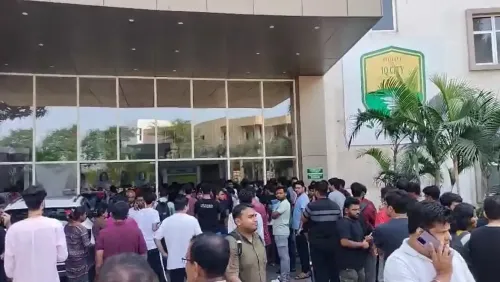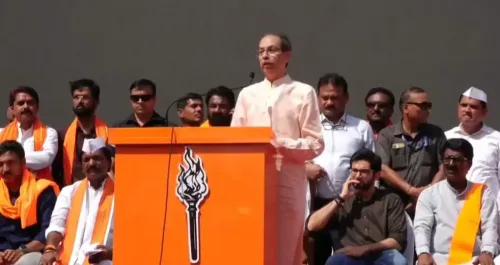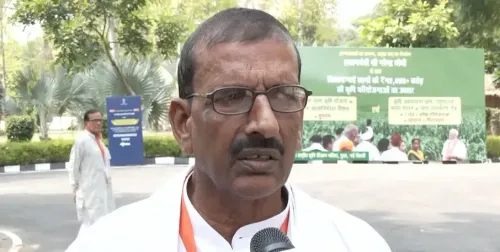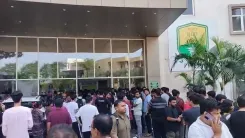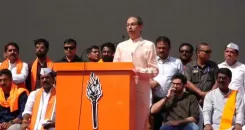BPSC Candidates Rally: Patna Police Refute Claims of Khan Sir's Arrest
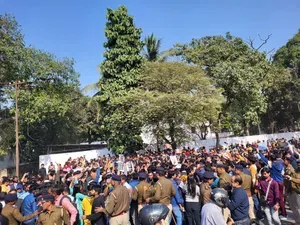
Patna, Dec 7 (NationPress) In light of rumors suggesting that educator Faizal Khan (popularly known as Khan Sir) was taken by the police while he supported the protesting BPSC candidates, the Patna Police strongly refuted these claims on Friday.
Khan Sir, accompanied by Guru Rahman, openly expressed their backing for the agitating BPSC candidates after the police's lathi-charge in Patna. They attended the dharna at the Gardanibagh area to demonstrate their solidarity with the candidates.
Earlier in the day, educators such as Khan Sir and Guru Rahman voiced their disagreement with the government's response to the situation and expressed support for the affected candidates.
Khan Sir, a prominent figure in education, criticized the use of force and highlighted the necessity for reforms in the examination process. In an interview with IANS, he stated that candidates should receive extra time for exam preparation to make up for the disruptions caused by delays.
“The BPSC should reopen the application portal for candidates whose submissions were hindered due to server problems. They should be permitted to submit their applications with an extended deadline,” Khan Sir stated.
“The normalization process needs to be scrapped, and a fair and transparent examination system should be implemented for future proceedings. The authorities should ensure a peaceful examination environment. A request was made for the authorities to maintain a calm and organized atmosphere during the exam to alleviate further distress for the candidates,” Khan Sir added.
Another notable educator, Guru Rahman, also condemned the lathi charge by the Patna police on BPSC aspirants, labeling it a sign of anarchy and a serious injustice to the students.
He joined Khan Sir in criticizing the authorities' actions and put forth specific demands to address the candidates' grievances.
“The BPSC chairman should provide a written assurance that the contentious normalization process will not be applied in the BPSC examination. This has been a significant concern for aspirants,” Guru Rahman remarked.
Guru Rahman emphasized the situation of around 80,000 candidates whose applications were rendered incomplete due to server issues, demanding that they be allowed to reapply.
He suggested a three-month extension to the examination schedule, enabling candidates ample time to prepare considering the disruptions they have encountered.
Hundreds of students took to the streets in Patna early on Friday, protesting what they claimed to be normalization issues in the 70th BPSC PT exam. They surrounded the BPSC office, and the protest intensified as the day advanced.
Due to the escalating protest, the Patna Police initially attempted to negotiate with the demonstrators but ultimately resorted to a lathi charge to disperse the crowd, resulting in injuries to several student leaders during this action.
The protesting students made their way to Gardanibagh, a designated site for their dharna in Patna, where they were joined by Khan Sir and Guru Rahman.
In the midst of the turmoil, rumors emerged that Khan Sir and student leader Dilip Kumar had been arrested, sparking widespread concern. However, the Patna Police clarified that Khan Sir had neither been arrested nor detained.
He was escorted away from the protest site while attempting to aid the agitating students and made his way to the Gardanibagh police station independently.
Patna SSP Rajiv Mishra reiterated that Khan Sir had not been arrested or detained and was repeatedly asked to vacate the police station.
“Khan Sir was consistently being requested to leave the police station but was unwilling to comply. He had arrived at the police station for the benefit of those students who had been detained by the police,” Mishra explained.
The Commission dismissed any validity to the rumors regarding normalization in the exam, labeling them as unfounded.
This incident underscores the charged atmosphere in Patna, with students demanding transparency and fairness in competitive examinations, as well as the considerable influence of educators like Khan Sir in mobilizing and advocating for student issues.
The situation remained tense yet under control as authorities continued to manage the evolving circumstances.

